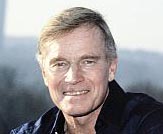Charlton Heston
It’s a shame that the mention of Charlton Heston brings forth not thoughts of his significant body of work (vers. 1.0), but a crazy old actor raising a rifle able his head, growling “From my cold, dead hands” like the pivotal moment in a drama where a tolerant man snaps, and stands up against the bully that’s massacred everything he’s ever held dear (vers. 2.0).
The video footage of Heston at the NRA conference remains an indelible image, and it undoubtedly tarnished his image as an actor, filmmaker, and gifted voice to that of a right wing extremist – that’s if one sides with the ‘liberal’ angle.
One can theorize that as people age, their views and stances change, perhaps drifting to extremes of right or left, or perhaps mellowing out, but what was so striking about Heston’s change was the drama he invested in that particular appearance, which rendered him more of a political figure than just an actor who worked hard all of his life in theatre, film, and TV.
He still worked hard, but the broad media seemed to handle him a little differently, arguably reporting his actions only when there was controversy or hyped controversy. I disagreed with his politics, but I couldn’t lose the affection for the actor, because Heston starred in many of my favourite films, be they historical dramas (The Ten Commandments, Ben-Hur), disaster idiocies (Earthquake), classic sci-fi (Soylent Green, The Omega Man), and classics such as Orson Welles’ Touch of Evil, or as Christopher Leinigen in The Naked Jungle (where Heston really hammed up the dialogue, turning ridiculous lines like ‘Leinigen’s woman’ into deliciously bad drama moments. Not necessarily his fault, but that mighty jaw and stentorian tone gave bad dialogue undeserving gravitas).
Warner Home Video’s been releasing small does of Heston’s own productions this year, made via Agamemnon Films which he ran with son Fraser Heston, and the gems have included Antony and Cleopatra [M] (1972), The Mother Load [M] (1982), and now A Man for All Seasons [M] (1988), and Treasure Island [M] (1990).
The surprise: Charlton Heston was a pretty capable director, aided by a top team of editors, producers, stunt coordinators, fight choreographers, and cinematographers. He knew how to put together a good picture, and it’s unfortunate he directed only 3 films.
A Man for All Seasons is unique for presenting Robert Bolt’s play, including the characters and scenes dropped from the 1966 film adaptation, so it provides a record of the epic play on film, and it’s largely successful in conveying Bolt’s brilliance as a dramatist.
Treasure Island marked son Fraser Heston’s directing debut, and like his father, he picked material that meant something to him on a personal level, surrounding himself with the best creative technicians, and exploited the richness of actors from the U.K. There are and will continue to be adaptations of Robert Louis Stevenson’s classic novel for film and TV venues, but this one is pretty solid, and features an outstanding score by The Chieftan’s Paddy Moloney. (Note to Fraser: given Ken Wannberg’s excellent Mother Lode score is available on CD, how about Treasure Island?)
The DVD also includes a steady commentary track by son Fraser, filled with solid production notes, anecdotes, and (obviously) fond recollections of dad Charlton. While informational, the track also humanizes the actor, which not please his detractors, but refocuses attention on his work, which is his most important legacy.
Both DVDs feature mattered transfers of films originally made for Ted Turner’s TNT network, although it seems the films were aired 1.33:1 but filmed with a widescreen ration in mind. Once in a while things seem a little tight, but not dangerously so, as with Columbia’s daft tightening of the ratio for Richard Fleisher’s 10 Rillington Street, or the too-tight matting in Joe Dante’s The Howling, and Sam Raimi’s Evil Dead.
One odd little motif among the elder Heston’s films seems to be a fixation on water: Antony, Man, and Treasure all begin with characters arriving by boat to their land destinations, whereas Lode has characters flying in by plane. Strange coincidence, or a fetish for dramas where the intros much occur over or on water?
In any event, read the DVD reviews, and serious: please release Moloney’s score.
Last quick note: also now online at Rue Morgue’s Staff Blog is my lengthy chronicle / tally of the various music used in / written for the original 1925 production of The Phantom of the Opera, which was recently released on Blu-ray by Image, and has been reportedly recalled due to some technical issues (such as Gabriel Thibaudeau’s score being in mono).
The essay is long, but hey, if you’ve a coffee, a donut, a sandwich, and an apple to consume and have nothing retentive to read, why not be baffled by the film’s complex soundtrack history?
.
.
Mark R. Hasan, Editor
KQEK.com ( Main Site / Mobile Site )
Category: EDITOR'S BLOG, FILM MUSIC, FILM REVIEWS






Connect
Connect with us on the following social media platforms.